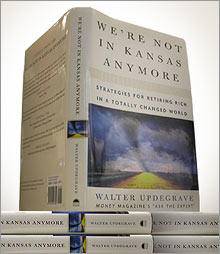|
|

|
|
More information on Updegrave's new book.
|
|
|
|
|
|
|
NEW YORK (CNN/Money) -
With the world situation looking very "iffy," I'm looking for some safe places to put my money. Specifically, I'm thinking of small stocks and international funds. What do you think?
-- Thad Crump, Conover, North Carolina
Gee, I hate to be a downer, but the first thing I think is that your investment strategy -- if you want to call it that -- is wrong in just about every possible way.
To begin with, that you think the world situation is looking "iffy," is not a reasonable foundation for making changes to a long-term investment strategy.
The world situation is always looking iffy. If it's not terrorism or the war in Iraq that's creating uncertainty, it's tension in the Middle East or ethnic conflict in former Soviet nations or the threat of nuclear missiles in North Korea or...the list can go on and on.
If you try to fashion a new investment strategy in response to each of these situations, you'll be moving your money around constantly. That would be good for brokers who collect fees and transaction costs. But not so good for your long-term results.
Go for T-bills if you're that worried
My second problem is that if I were concerned about some sort of looming global crisis, I wouldn't go to small stocks or international funds, neither of which has much of a reputation for being a safe haven in times of turmoil.
I'd be huddling down in the most rock-solid investment I could find -- namely, U.S. Treasury bills. That's where people go if they're afraid the world might blow up because they figure that no matter what happens, the U.S. Treasury will still honor its promises to pay interest and principal on its obligations.
I suspect the reason you've singled out small stocks and international funds is simply because these investments have had quite a good run in recent years. Over the past three years or so, small stocks have outperformed large-company shares by a margin of about 50 percent, while international funds have outrun their domestic counterparts by almost two to one.
But that's no measure of safety. It's more a reflection that small stocks generally do well in the earlier stages of an economic recovery and international shares had quite a tailwind with the dollar's weakness in recent years.
But economic growth, though still quite robust, seems to be slowing from last year, and many economists believe the dollar may be stabilizing against the Euro. All of which is to say that the asset classes that dominated the past few years may not be the ones that do best the nest few years.
Advice for the real world
Add it all up, and I think you've got to take a radically different view on how to invest your money. Here are my suggestions on how to proceed:
Don't let the news dictate your investment strategy. I'm all for keeping up with the news in the world, however depressing that can sometimes be. But, remember, news by it's nature focuses on the short-term: what's happening now.
As an investor, you want to think ahead, way ahead. Twenty years from now there will be a whole other set of world problems to get upset about. But we'll still be here, economies around the world will still be growing and financial assets, by and large, will still be increasing in value. Don't let short-term noise deter you from investing for the long-term.
Avoid the "rear-view mirror" syndrome. One of the biggest mistakes investors make is trying to buy past performance. They see what did well the last quarter or last year, and assume those numbers will continue into the future.
Unfortunately, that's not typically the case. After an asset class has had a big runup, its prospects for future outsize gains dwindle. Small stocks dominate for a few years, and then they give way to large shares.
The same see-saw effect occurs with value- vs. growth-oriented funds. By focusing on what's been hot lately, you run the risk of throwing money in just when the inevitable cooling off period begins.
Make your investment focus broader, not narrower. Instead of trying to home in on particular investments or asset classes that might do well in a particular economic environment or political scenario, think of building a portfolio that can do well in a variety of situations.
The best way to do that is by including a variety of asset classes: funds that invest in large and small stocks, growth and value shares and different sorts of bonds. This way, your portfolio doesn't get clobbered if things don't work out as you think they might.
For tips on how to put together such a portfolio, I suggest you first read our Money 101 lesson on asset allocation and then go to our Asset Allocator for specific guidelines on how to structure a portfolio given your appetite for risk.
Of course, after following this advice the world situation may still look iffy. But at least your portfolio won't.
Walter Updegrave is a senior editor at MONEY Magazine and is the author of "We're Not in Kansas Anymore: Strategies for Retiring Rich in a Totally Changed World."

|